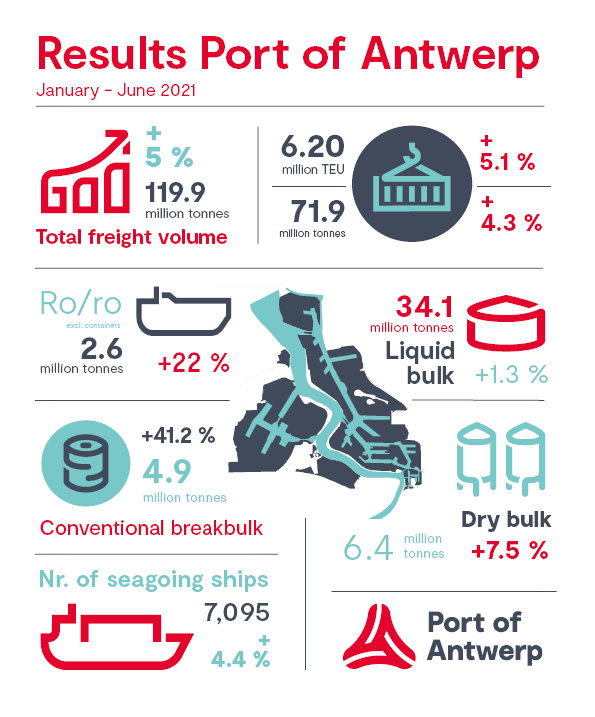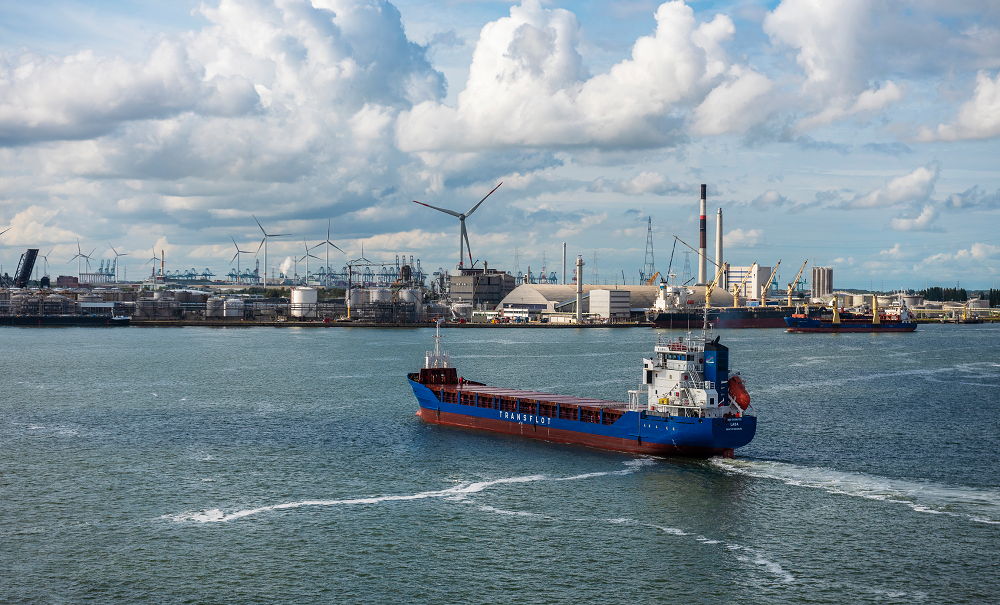Port of Antwerp experiences growth in first half of year
Throughput with UK rises despite Brexit
July, 9, 2021 - During the first six months of 2021, 120 million tonnes were handled in the Port of Antwerp, an increase of 5% compared with the same period last year and status quo compared to 2019, despite the impact of the ongoing pandemic. Cargo to and from the UK and Ireland also shows positive figures; the expanded shortsea connections in response to Brexit are proving effective.
Growth despite ongoing corona crisis
Containers are the only cargo type that has continuously grown since 2014, up by 4,3% in the first half of the year compared to 2020 and by 3,9% compared to 2019 (in tonnes). Conventional breakbulk grows by 41,2% compared to 2020 and equals the throughput of the first 6 months of 2019. The throughput of iron and steel, the main goods group in this segment, increased by 37,8% due to a peak in the supply of steel. RoRo also did very well in 2021 and increased by 22% compared to the first half of 2020.
Dry bulk handling increased by 7,5% but there are fluctuations because some products, such as fertilisers, are seasonal. Liquid bulk grew slightly by 1,3% compared to 2020 but decreased by 6,1% compared to 2019. In May, the volume of fuels was the highest since October last year, while the handling of chemicals increased by 8,9% compared to 2020. Demand for chemicals is booming globally due to the recovery in industrial production and is exceeding pre-pandemic levels.

Brexit: growth in a declining market
With an annual cargo flow of around 15 million tonnes, the United Kingdom is the third largest maritime trade partner for the port of Antwerp. The start of Brexit at the beginning of this year therefore created major challenges due to increased administrative complexities and more controls, which resulted in congestion, longer transit times and higher costs. As a result, the flow of goods between the EU and the UK is decreasing. Despite these difficult conditions, however, the port of Antwerp recorded growth in total throughput of 11,1% with the UK and 12,1% with Ireland in the first half of the year compared to the same period in 2020.
In preparation for the Brexit, Port of Antwerp has put all its efforts into further expanding short sea connections with the UK and Ireland in order to achieve the modal shift from ferry to container transport. Five years after the ‘Leave’ vote, the port of Antwerp is now connected to 12 British and Irish ports, and we see that Irish importers and exporters are increasingly abandoning the land bridge over the UK and are instead opting for a direct maritime connection.
Antwerp@C takes important step towards CO2 reduction
The Antwerp@C consortium is taking important steps forward in the transition to a sustainable, low-carbon port. The feasibility studies have been completed. The consortium is preparing to enter the design phase. The project, an initiative by Air Liquide, BASF, Borealis, ExxonMobil, INEOS, TotalEnergies, Fluxys and Port of Antwerp, has the potential to reduce CO2 emissions in the port of Antwerp by half by 2030 by capturing CO2 and using it or storing it permanently.
Jacques Vandermeiren, CEO Port of Antwerp: "We knew that Brexit would have major consequences for the transport of goods between Europe and the UK. By preparing ourselves well and focusing on short sea connections and LoLo cargo, we can convert the challenges into opportunities. The positive half-year figures for cargo to and from the UK and Ireland confirm this. After Brexit, Antwerp wants more than ever to be the gateway between Europe and the UK and Ireland."
Annick De Ridder, Port Alderman: "Despite the difficult circumstances in which we started 2021, we can show that the port is holding its own and is once again even recording growth in container handling. The economic urgency for extra container capacity is clearly demonstrated, more than ever. The figures are a confirmation of the resilience of our port and of the flexibility of all employees who ensure that everything keeps running.”
